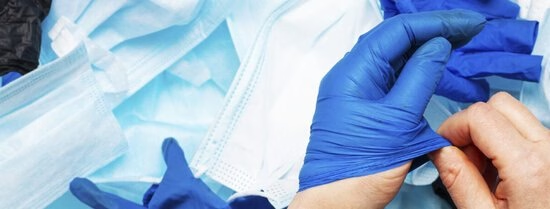Seven garbage bags of waste per intensive care patient per day, and that is just a fraction of the environmental impact of entire hospitals. Circularity is the answer, but how to achieve that without impacting the quality of healthcare or straining an already overburdened work force? An interdisciplinary Convergence collaboration rises to the challenge.
100% circular
The COVID-19 pandemic has been a mixed blessing in a time where single-use plastics in healthcare were rapidly becoming the new normal. ‘On the one hand, we were so busy providing high quality healthcare under an insurge of patients that any sustainability efforts were put on the backburner,’ Hunfeld says. ‘But hallways full of wastebaskets crammed with single-use protective gear also sent a powerful, urgent message.’ If that weren’t enough, the volatility in supply, caused by long supply chains and harbours being closed at a moment’s notice, also stressed the need for circularity.
As soon as the COVID dust had settled somewhat, an upbeat interdisciplinary team set to work. ‘Now is the time to reduce the healthcare sector’s ecological footprint – for healthy people and a healthy world,’ Diehl says. ‘We have the combined ingenuity of TU Delft, Erasmus MC, and Erasmus University, more than 15 green teams in Erasmus MC are all geared up, and the national Green Deal 3.0 on Sustainable Healthcare has just been signed. We believe that a 100% circular intensive care department is feasible by 2030, and entire hospitals by 2050.’
"Now is the time to reduce the healthcare sector’s ecological footprint – for healthy people and a healthy world"
Dr. Ir. J.C. (Jan Carel) Diehl
Inclusive Sustainable Healthcare, Industrial Design Engineering, TU Delft
Total value chain approach
Combining expertise in medical sciences, engineering, design, policy, operations research, supply chain management, and behavioural sciences, the team applies a total value chain approach following the ten R’s of circularity (refuse, rethink, reduce, reuse, recycle, etc.). ‘We address product choices, user behaviour, sterilisation for multi-use, and recycling,’ Van Raaij says. ‘On the procurement side, we can for example switch to suppliers that use recyclable packaging and those who offer multi-use rather than single-use products. Erasmus MC also excels at co-developing new solutions through innovation procurement.’
We address product choices, user behaviour, sterilisation for multi-use, and recycling
Prof. dr. ir. E.M. (Erik) van Raaij
Purchasing and Supply Management in Healthcare, Rotterdam School of Management
Switching to multi-use products may appear to be low-hanging fruit, but it requires investments in in-house sterile processing, on the procurement side and, potentially, from the users. ‘If nurses now dispose of scissors after using them, we can’t expect them to spend two minutes cleaning them prior to sterile processing,’ Hunfeld says. Diehl adds that an effort towards circularity may start with looking into a single product, but it always affects an entire logistics chain and the context in which they are used in a hospital. ‘These off-product impacts come to light during the different ‘mapping’ methods we apply such as product and user journeys and materials flow analysis.’
Awareness training is at the heart of the envisioned transition as it helps ensure that the correct choices are made and implemented on a daily basis. ‘Take personal protective gear; there is an overuse in items such as gloves, eye protection and other protective gear,’ Hunfeld says. ‘We address this by clarifying and refining protocols. But what we really want is for whole departments, the entire hospital, to live and breathe sustainability.’
Curious about the full article? Read more on the Covergence website.
- Professor
- Assistant professor
- Associate professor
- More information
Convergence
This project is one of the great examples of the results of convergence. The urgent and complex societal challenges of our time call for convergence; the crossing of boundaries between institutes and disciplines to create new perspectives and solutions. For this reason, TU Delft, Erasmus MC and Erasmus University Rotterdam are joining forces in the Convergence.
- Related content

